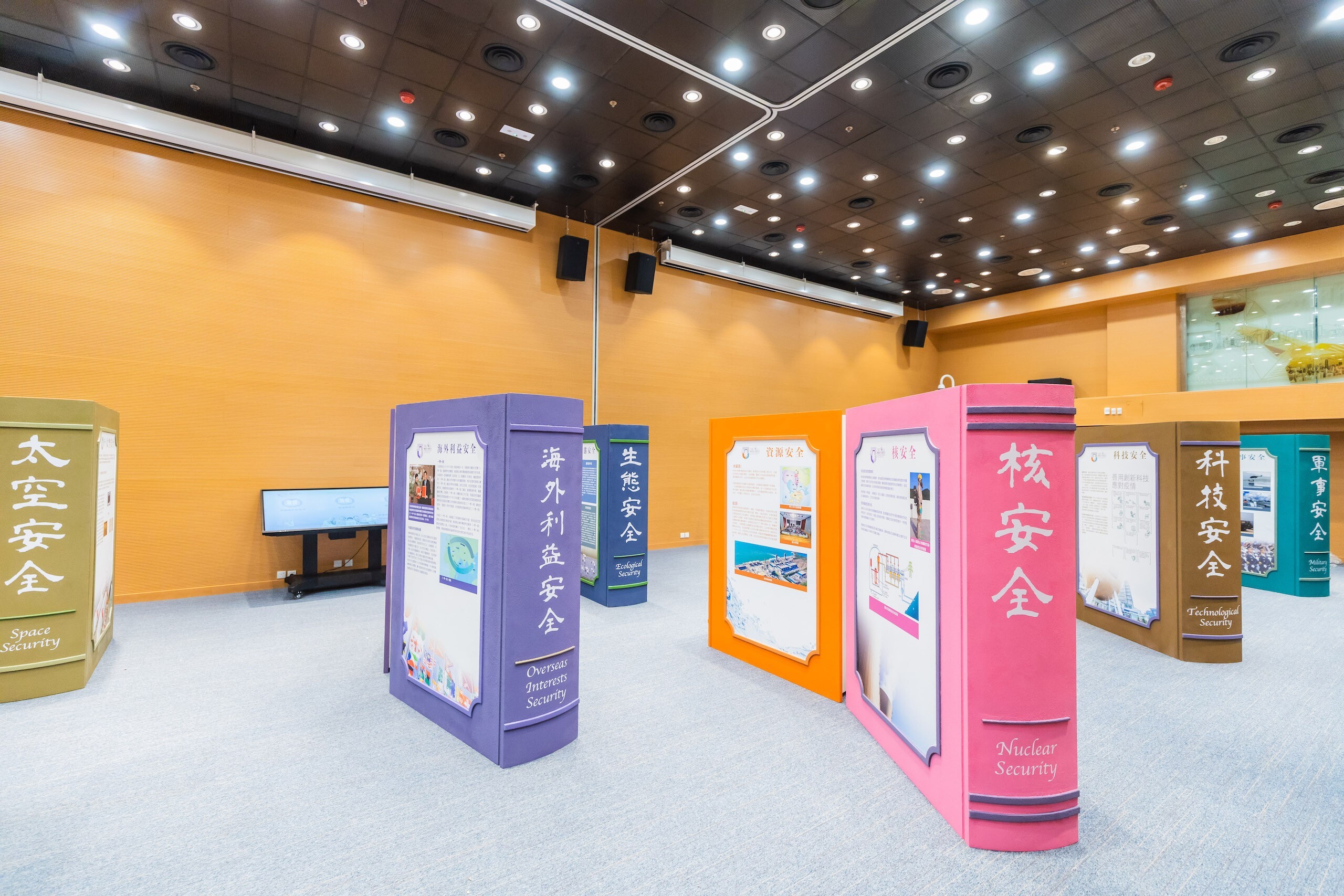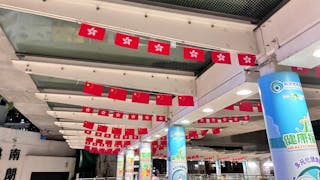中環的展城館由4月15日至5月2日,用作「全民國家安全教育日2021」公眾教育展覽場地,從展覽內容及香港中小學課程的《香港國家安全教育課程框架》中可以看出,國家安全教育在香港不僅加快推行,而且深化和擴大了。
穩定香港特區並提高管治能力
首先,4月15日開始的國家安全教育展覽,在幾個方面都具有重要意義──國家安全的概念包括16個方面:政治安全、國土安全、軍事安全、經濟安全、文化安全、社會安全、科技安全、網絡安全、生態安全、資源安全、核安全、海外利益安全、生物安全、太空安全、深海安全和極地安全等。
最重要的方面包括政治和領土安全。在政治上,展城館的展覽強調,實施《香港國安法》不僅「阻遏」了港獨與外國勢力勾結,而且還讓香港市民繼續依法享有基本權利和自由。
最有趣的是,一幅展板展示政治安全的重要性,把《香港國安法》與全國人大3月份通過的完善香港選舉改革制度相結合,以此作為「一籃子方案」,以穩定香港特別行政區並「提高管治能力」。
香港仍肩負中西交流平台任務
4月22日,香港特別行政區教育局公布了實施國家安全教育的中小學課程框架。 在小學階段,從小學一年級到小學六年級的中文教學包括老師要幫助學生了解中華文化、文化傳統和文化承傳,目的是讓學生培養強烈的文化認同感,他們可以通過閱讀和其他語言活動來積累他們對優秀傳統文化的認識。
此外 ,從中一到中三的技術教育科目和科學科目需要更深入地向學生灌輸國家安全意識。 例如,科技教育科要求教師使用案例研究,與學生分析討論通過互聯網傳播的謠言,如何產生負面和嚴重的後果。此外 ,必須教育學生認識安全和負責任地使用互聯網的重要性。 學生必須了解互聯網有潛在的安全威脅,因此,正確使用互聯網是至關重要的。
理科要求向學生講授新的安全領域,例如生物安全、公共衛生和傳染病。 學生將被要求學習生態和環境安全,以及資源(水、石油和能源)安全的主題,以便全面理解可持續發展。
從中四到中六還會以更深入的方式學習國家安全,老師將向學生講解中美之間的貿易衝突,以及「一帶一路」倡議。目的是讓學生了解香港作為中國的一部分,為海外投資者在內地投資提供了一個窗口,同時也是內地企業接觸海外的國際平台。
總之 ,香港特別行政區的國家安全教育已經得到了深化和強化,當中的挑戰是為所有學校提供更多的資源和人力支援,以便學校管理層和教師能夠並且順利實施國家安全教育,造福學生和整個社會。
Deepening National Security Education in Hong Kong
Judging from the content of the national security education exhibition that began on April 15, and from the new syllabi of the secondary school subjects in Hong Kong, national security education has not only been accelerated but also deepened and broadened in the special administrative region.
First and foremost, the national security education exhibition that was kicked off on April 15 was significant in several aspects. The concept of national security encompasses sixteen dimensions: political, territorial, military, economic, cultural, social, technological, Internet, ecological, resources, nuclear, overseas security interest, biological, space, deep sea and the Antarctic and Artic security.
The most important aspects include the political and territorial security. Politically, the exhibition at the City Hall emphasizes that the implementation of the national security law has not only “reduced” the situation of the collaboration between local separatists and foreign forces, but also allowed the people of Hong Kong to enjoy their basic rights and freedom in accordance with the law. Most interestingly, an exhibition board demonstrating the importance of political security refers to the combination of the national security law with the electoral reform package approved by the National People’s Congress in March as a “boxing package” stabilizing Hong Kong and “elevating the governing capacity of the special administrative region.” Another exhibition board that emphasizes the significance of political security refers to “localism” as an enemy “challenging” and “resisting” the nation, tracing back those localist activities to the anti-national education campaign in 2012, the Occupy Central Movement in 2014, the Mongkok riot in 2016, and the anti-extradition controversy in 2019. These localist forces, according to the description, “begged for foreign intervention in Hong Kong matters,” “weakened the law-abiding awareness of the youths,” “endangered national security,” and “seriously undermined the social order” of the Hong Kong Special Administrative Region (HKSAR). Obviously, this official version of the detrimental impacts of “localism” is politically and educationally significant.
Two exhibition boards are devoted to explaining the concept of territorial security. One of them emphasizes that territorial security is a necessary condition for “national survival and development.” It historically describes how Hong Kong was traditionally and territorially an indispensable part of China, going back to the Qin, Song, Yuan, Ming and Qing dynasties. It also emphasizes that the younger generation of Hong Kong people are fortunate and do not experience the sufferings of the older generation, including the old generation of Chinese people who were the victims of foreign invasion and imperialism, ranging from the Portuguese intrusion into the Tuen Mun area back in 1521 to the Opium War during the Qing dynasty, and from the Japanese invasion of China in the September 18 incident in 1931 to the Japanese invasion and occupation of Hong Kong on December 25, 1941. Another exhibition board focuses on the stationing of the People’s Liberation Army (PLA) in the HKSAR on July 1, 1997 as a realization of the sovereignty of the People’s Republic of China (PRC) over the territory. Interestingly, the exhibition board ends with a note saying that since the HKSAR was established, “internal and external forces that undermine territorial security persists latently” until the enactment of the national security law.
The exhibition boards that emphasize political and territorial security were accompanied by the important remarks made by the Director of the Liaison Office, Luo Huining, who said on April 15 that China “will teach a lesson to foreign forces that intend to use Hong Kong as a pawn” (The Standard, April 15, 2021). Moreover, the Director of Beijing’s Office for Safeguarding National Security in Hong Kong, Zheng Yanxiong, said on the same day that the people of Hong Kong accepted and embraced the national security law (The Standard, April 15, 2021). Zheng heaped praise on the Chief Executive, Carrie Lam, and the territory’s disciplined serves for showing justice and fairness in the enforcement of law to combat crime and to stabilize the city. He added that they “are the safeguarding gods for the national security in Hong Kong.” Zheng also praised the judges, prosecutors, lawyers and legal experts for their supportive attitude toward the necessity of safeguarding national security in the HKSAR.
On April 22, the Education Department of the HKSAR publicized the new syllabi of the primary and secondary school subjects that enforce national security education. At the primary school level, the Chinese language education from primary one to primary six includes the need for teachers to help students understand the Chinese culture, tradition and heritage. The objective is to nurture a strong sense of Chinese cultural identity among the students, who can accumulate their knowledge on the excellence of the Chinese culture through reading and other language activities.
Moreover, the technology education subject and the science subject from secondary level one to secondary level three need to inculcate national security awareness to the students in a deeper way. For instance, the technology education subject will require teachers to use case studies to analyze and discuss with students how rumors that are spread over the Internet can have negative and serious consequences. Furthermore, students must be taught to realize the importance of using the Internet safely and responsibly. The Internet must be understood by students as having potential security threats, and as such, the proper use of the Internet is of paramount importance.
The science subject is required to teach students on new security frontiers, such as biological security, public health and infectious diseases. Students will be required to learn the topics of ecological and environmental security as well as resources (water, oil and energy) security so that sustainable development can be understood comprehensively.
Five subjects from secondary level four to six also examine national security in a much deeper way: (1) business, accounting and finance; (2) health management and social care; (3) information and technology; (3) chemistry, and (4) physics. In the subject of business, accounting and finance, students will be taught on the trade disputes and conflicts between China and the US, and the topic of One Belt One Road. The objective is to let students understand that Hong Kong as part of China provides a window for overseas investors to invest in the mainland, while being an international platform for mainland Chinese enterprises to reach out to the overseas countries. Economically, the relations between Hong Kong and mainland China are close, mutually beneficial and inseparable. Without the protection of economic security, the two places cannot and will not achieve mutual economic benefits. The subjects of health management and social care, and of information and technology tend to overlap in their emphasis on the students’ awareness and proper use of the Internet, while realizing the importance of morality and responsibility in Internet activities. The subjects of chemistry and physics stress the importance of resources security.
While the hardware components of the national security education, namely the syllabi, textbooks and references (the government has prepared a whole set of references for schools) are already entrenched, the challenge is to train the trainers. A survey conducted by the Hong Kong Federation of Education showed that 81 percent of the 280 principals and vice principals said that the current positions at primary and secondary school levels are not enough, and that it is difficult for them to follow up with the coordination work. 74 percent said that many teachers are unfamiliar with the topics concerned, while 64 percent expressed the view that the current syllabi are already tight. 57 percent replied that the teaching resources are inadequate. As such, it is urgent for the education authorities to provide more on-the-job training for the teachers and to inject the necessary resources to primary and secondary schools.
In conclusion, national security education has already been deepened and broadened in the HSKAR. The challenge is to provide more resources and manpower support for all the schools so that the principals, vice principals and teachers can and will implement national security education smoothly to the benefit of the students and the entire society of Hong Kong.
原刊於澳門新聞通訊社(MNA)網站,本社獲作者授權轉載。




































